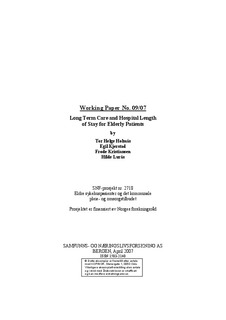Long term care and hospital length of stay for elderly patients
Working paper

Åpne
Permanent lenke
http://hdl.handle.net/11250/166060Utgivelsesdato
2007-04Metadata
Vis full innførselSamlinger
- Working papers (SNF) [809]
Sammendrag
The proportion of elderly people in the population is increasing and old patients’ bed occupancy rate in hospitals increases as a fraction of total bed occupancy. Because old patients, on average, are frailer than other age groups their length of stay (LOS) at hospitals is longer than average. In this paper we ask whether or not frailty and the need of more comprehensive hospital treatment are the only explanation behind a comparatively long LOS for elderly patients. Of particular interest is the fact that within health care for the elderly there may be conflicting interests between providers of hospital care and providers of long term care services. We study whether or not the organisation and use of resources at hospital level influence LOS for the elderly, but also whether or not resources spent by providers of long term care services are of significance. In accordance, we question whether or not formal contracts and certain coordination arrangements between hospitals and providers of care services matter for LOS. We conclude that hospital LOS for elderly patients strongly depends on the interaction with the long term care services and the organisation and resources utilized in this sector. The results point to the importance of seeing the organising and financing of hospitals and long term care in connection. We suggest that providers of hospital care and long term care are given stronger incentives to cooperate and coordinate their supply of services towards elderly patients than what is the case at present.
Utgiver
SNFSerie
Working paper2007:9